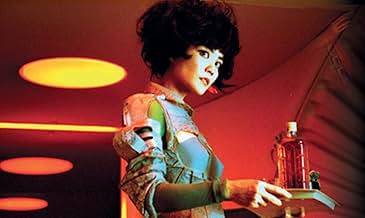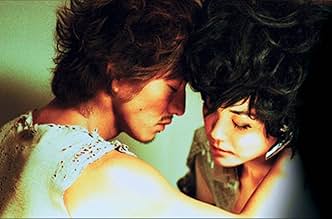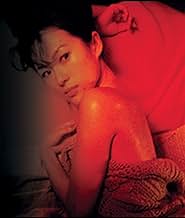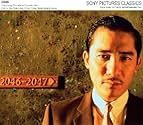Nachdem ein Science-Fiction-Autor die Frau verloren hat, von der er glaubt, sie sei die einzige wahre Liebe seines Lebens gewesen, treten andere Frauen im Laufe mehrerer Jahre in das Leben d... Alles lesenNachdem ein Science-Fiction-Autor die Frau verloren hat, von der er glaubt, sie sei die einzige wahre Liebe seines Lebens gewesen, treten andere Frauen im Laufe mehrerer Jahre in das Leben des Schriftstellers.Nachdem ein Science-Fiction-Autor die Frau verloren hat, von der er glaubt, sie sei die einzige wahre Liebe seines Lebens gewesen, treten andere Frauen im Laufe mehrerer Jahre in das Leben des Schriftstellers.
- Auszeichnungen
- 38 Gewinne & 81 Nominierungen insgesamt
- Chow Mo-wan
- (as Tony Leung)
- Wang Jie-wen
- (as Dong Jie)
- Bird
- (as Bird Thongchai McIntyre)
- Ah Ping
- (as Siu Ping-Lam)
- Party girl
- (as Sabrina Cheung)
- Dabao
- (as Ching Siu-Lung)
Empfohlene Bewertungen
At the start, the film feels episodic and disjointed, as writer/director Kar Wai Wong reveals in gradual stages the complex story he is telling. We can tell that this is a movie that will require our full and undivided attention if we hope to enter into the minds of the filmmakers and make any real sense at all out of it. But after some initial confusion, most of the early ambiguity begins to fade away as the major themes and characters come to the fore. Chow is a man who has clearly lost the love of his life and who has since been trying to come to terms with that fact in his later dealings with women. He has made a decision - whether conscious or unconscious we are never really sure - to keep women at arm's length, being willing to bed or help them but not allowing himself to enter into any permanent or meaningful relationships with them. Instead, he uses his writing to express those yearnings for true companionship that he cannot allow himself to act upon in real life.
Unlike many Chinese films, which enact their tales against expansive landscapes bathed in glorious sunlight and vibrant colors, "2046" is set in a claustrophobic world of dingy rooms and darkened hallways, with the camera almost never journeying outdoors or even pulling very far back from the actors in the frame. The effect of this is to plunge us fully into the world and minds of the characters, particularly that of Chow, whose thoughts and musings become the canvas on which the story is painted. Tony Leung Chiu Wai gives a subtle, masterful performance as do the various actresses who play the women in his life. It is his affair with Bai Ling, a beautiful prostitute who wants more out of their relationship than Chow is willing to give, that leaves the greatest mark on our heart.
There are times when the movie seems almost too fancy and showy for its own good, when the simplicity of the theme gets buried under the complexity and artiness of the filmmaker's style. But this is, for the most part, a challenging and stimulating work that moves us even when we don't fully understand it.
Some people commenting in this forum have expressed the view of Mr. Wong's film being futuristic because the way the film starts. But basically, those futuristic sequences last so little on the screen that it might be a misnomer for "2046" to be deemed about the future, when in reality we are taken back to the sixties when Mr. Chow is seen so much in love with Bai Ling.
Mr. Wong gives us a vivid account of what the two lovers had together, but he also takes us back when something is revealed about Mr. Chow we never knew about his involvement with SuLi Zheng, the mysterious woman who is lucky in winning for him an enormous amount, but while he falls in love with her, she coolly lets him go.
We are also shown Wong Jing Wen, who Mr. Chow had a passionate love affair with, in the previous film. It appears the involvement they both had is now clearly forgotten, or maybe it wasn't as important as it once appeared to be.
The director's technique calls for an infinite amount of medium shots, usually over the shoulder of the person that listens. As a matter of fact, there is hardly any scenery in the film since most of the action either takes place while the characters are seen in conversation, or in bed where some of the torrid encounters take place. The futuristic scenes seem to be a sort of limbo where the characters, like the beautiful Android, seems to in in a world of her own.
The best asset in the film is the music the director adds to the different scenes. Some of the music is nostalgic, some operatic, or depending on whatever is being emphasized at the moment. The music enhances the action in ways that make the film hard to forget.
The best thing the director has in the film is the enormously talented Tony Leung. Mr. Leung is an actor that is always interesting to see in anything. In this film, Mr. Wong and his main actor show how attuned they both are to their collaboration. Ziyi Zhang is tremendously appealing as Bai Ling, the woman that loved intensely and suddenly finds herself on her own after the affair ended. Gong Li is seen briefly as SuLi Zheng, the mysterious woman with the one black globe he meets in Singapore. Also Maggie Cheung and Carina Lau contributed to the film as the women in Mr. Chow's life.
"2046" is a hypnotic piece of film making because the magnificent style which Kar Wai Wong gives to everything in the film to achieve this moody piece that examines love relationships in ways that are seldom seen in the movies.
Without giving too much away, the film takes place in Hong Kong and Singapore in the 60's. The main character, Chow, is a writer and womanizer. Part of the story takes place in his work, a science fiction tale called 2046.
The story is told out of sequence, with past and present jumbled. In a clever use of irony, we gradually understand that the future is being used to tell the past. Some scenes are presented early, in a way that is confusing until the context is presented later.
There are 3 female characters who are in his life, and the story is segmented accordingly.
The cinematography is beautiful. Interestingly, Wong uses 3 colors nearly exclusively: Blood red, sea green, and yellow. Sometimes he will use light to make those colors stand out, other times it is the objects themselves which are in that color.
I would characterize the story as one of love and loss. There is one poignant scene where, after he realizes what has been happening, he states that timing is crucial in love.
The film is well acted, the characters are understandable if not necessarily ones we can identify with, and the story gradually allows itself to be revealed, a peek here and a peek there, until all the pieces fall into place.
Turn off the lights, cuddle up with a glass of wine, and see this one. Well worth it.
The novel he was writing has been a science fiction at first. Whereas, he's driven by a serendipity that the name of this novel "2046" is also the room number in which he and his ex has shared a love. Into that room, now a harlot settles in. He enriches his novel by putting himself as the true love of this harlot staying in room 2046. As destiny would have it, when the harlot meets him she really falls in love with him. By courtesy of her swallowing his bait, the novelist subjoins an erotic component into his novel. Let's gather together the first phase of the movie: We have one man and two woman. First woman left him 2 years ago, and he is still in love with her. Then at the present time, the second woman falls in love with him.
The second phase is the vengeance of the novelist from the woman he loved in 1967. This phase forms the essence of the novel: The future in the year 2046. Future is under the control of dreamers. Everybody who can dream and who can love, can travel into 2046 deep in their heart to recapture their lost memories. The novelist never goes there, 'cause he knows that if he goes once, he would never return to the present time, and would stay stuck in the future, living in the memories. Instead of making himself gone, he sends her inconstant love into 2046 as an android woman. Living as an android, the woman doesn't have a heart. But a young man falls in love with her. She yearns for him so much, but she could never express her feelings nor the look in her eyes could ever change; since she has no heart no more. She realizes that she deserves to be loved, and denies herself. She begins suffering of the love she remained lighthearted to the novelist 79 years ago. Witnessing her repentance, the novelist forgives her love; and wants her back at the present time in 1969.
At the last phase the novelist loses himself before his love finds him. Because his novel concludes to an ending which he doesn't have the love for her true love anymore, he depletes his inspirations to finish his novel without the memories of his past love. When she returns to him, he stands indifferent.
An amazing story layering ahead, including tons of short stories inside, and the director Wong Kar Wai uses a giddy and ravishing cinematography for use of symbolism. It's the viewers' duty to solve the puzzles of the storyline, to match the short stories with their attributions and to set in order of the straight-going novel versus unsteadily progressing movie; which altogether I shared with you above.
Both director and the writer of 2046, Wong Kar Wai presents a novel adaptation in the movie, and a movie adaptation in the novel; in conclusion a mixture of two arts on silver screen.
2046 was the same. Already released on DVD me and my girlfriend were quite interested in seeing it. Having already seen "In the Mood for Love" we were looking forward to something much the same, except hopefully a little faster in pace and emotionally-heated. I thought I was going to be the Hero renting a romance (which I don't normally go for) but it turned out to be a disappointment.
Perhaps it is not so much the fault of the movie, but of the trailers that lead you to believe that the movie is something that it isn't.
The movie is, like many other films from Kar Wai Wong, a visual masterpiece in my opinion. I was riveted to the images he is truly a modern painter. This is not to be underestimated. This is enough to get you through the whole movie, despite its crawling pace. Simply for the images I can understand that many viewers would love this movie.
But it takes more then that to make the "ultimate love movie" (as it was advertised here in Germany). I found many parts in the movie confusing and mixed up, I got the impression towards the end that the movie might not be in chronological order. If it isn't, then there is much more to investigate for me, if it is, then I have to say that the movie isn't that clear, and that the characters motives and feelings are not always properly portrayed.
If this was a book, I would love to read it. Simply to get into the heads of the characters and find out what they were thinking, what was driving them, and how they were feeling. Perhaps that is what is left out, perhaps that is why we find it so odd here in the West. We are used to romances being opened and voiced, and usually simple. We are not used to people feeling emotions but hiding their motives behind those emotions, which might be more understood in a conservative society such as China.
This is a movie I would love to own, and watch over and over again, just to try to understand if there is any magic hidden that cannot be seen at the first watching. I would not be surprised if that is how it is, but the long dragging scenes might hinder me from sitting though it more then 2 more times, because it drags. Perhaps next time Kar Wai Wong should hire a brutal editor and good writer to get his ideas out, because this movie had greater potential then what it became. Still, for me it gets 7/10 : its far from BAD.
Wusstest du schon
- WissenswertesEach character speaks their own languages. Mr. Chow speaks Cantonese, Bai Ling speaks Mandarin, and Tak speaks Japanese, even when talking to each other. Even so, they seem to understand each other perfectly.
- Zitate
Chow Mo Wan: Love is all a matter of timing. It's no good meeting the right person too soon or too late. If I'd lived in another time or place... my story might have had a very different ending.
- Alternative VersionenChinese version is edited for sexuality in the Ziyi Zhang/Tony Leung love scenes.
- VerbindungenFeatured in Belas Artes: A Esquina do Cinema (2012)
- Soundtracks2046 Main Theme
(Percussion)
Composed and Arranged by Shigeru Umebayashi
Licensed To Virgin, EMI
(p) & © Block 2 Music Company Ltd.
Top-Auswahl
Details
Box Office
- Budget
- 12.000.000 $ (geschätzt)
- Bruttoertrag in den USA und Kanada
- 1.444.588 $
- Eröffnungswochenende in den USA und in Kanada
- 113.074 $
- 7. Aug. 2005
- Weltweiter Bruttoertrag
- 20.207.146 $
- Laufzeit2 Stunden 9 Minuten
- Farbe
- Sound-Mix
- Seitenverhältnis
- 2.35 : 1
Zu dieser Seite beitragen



































